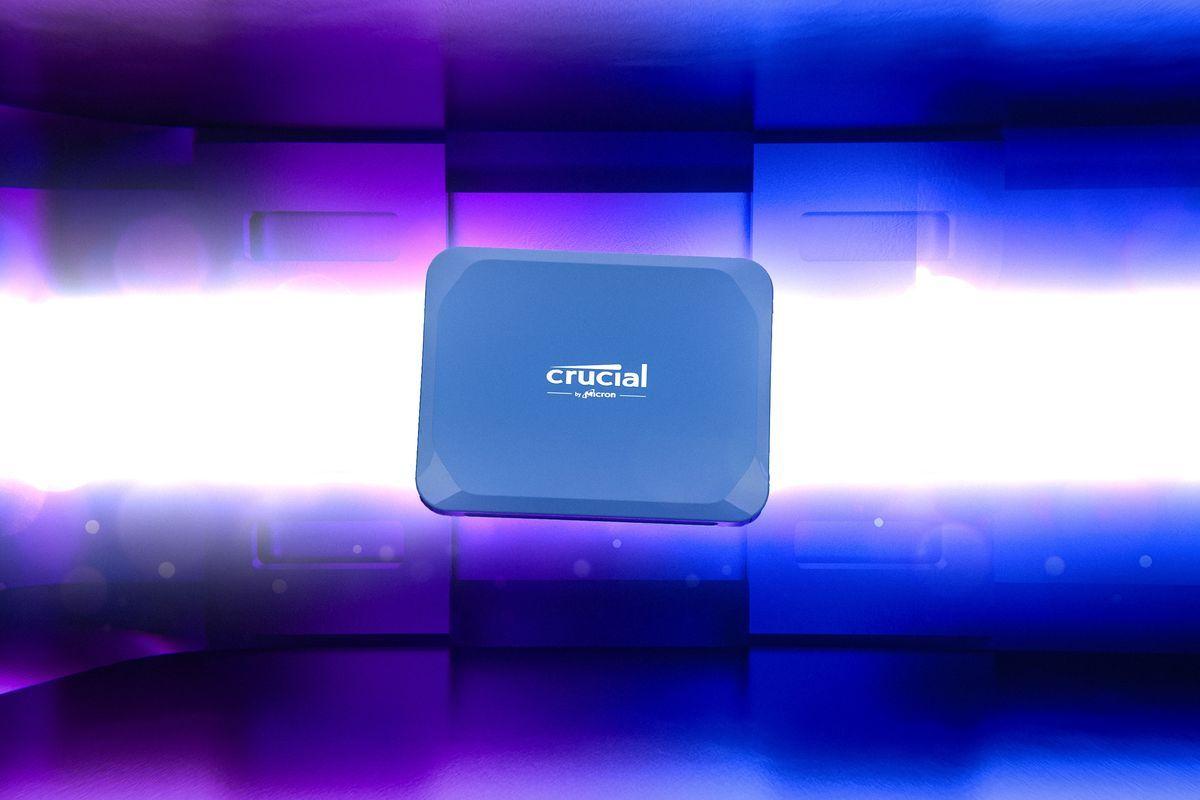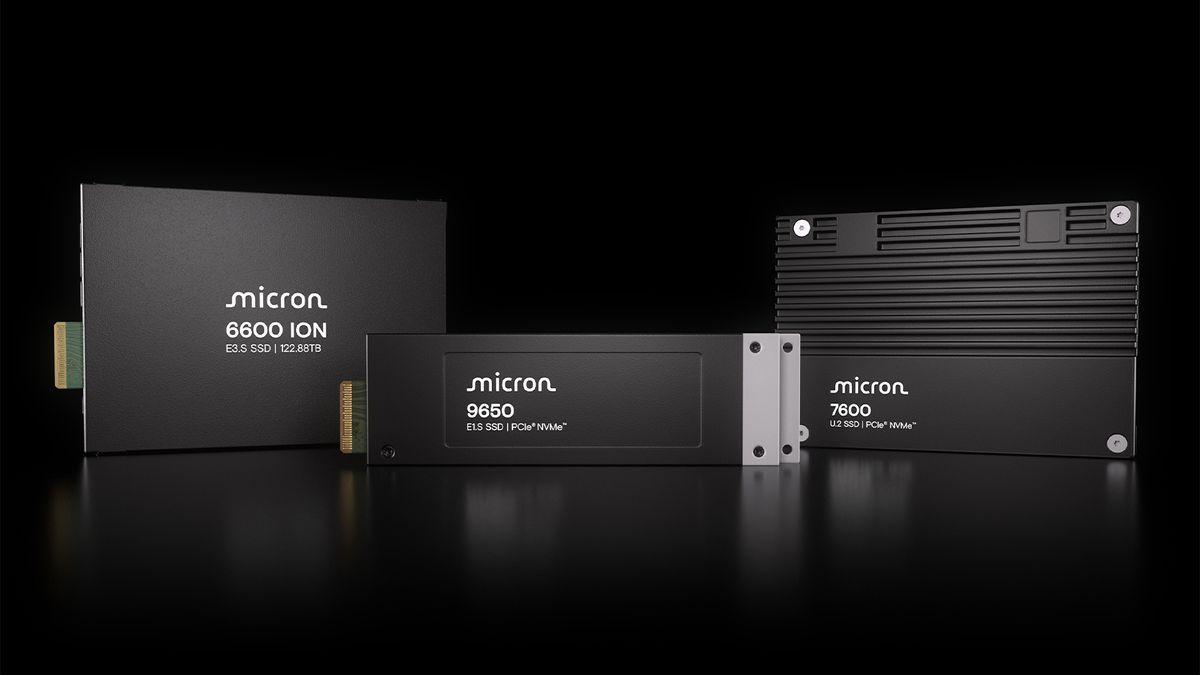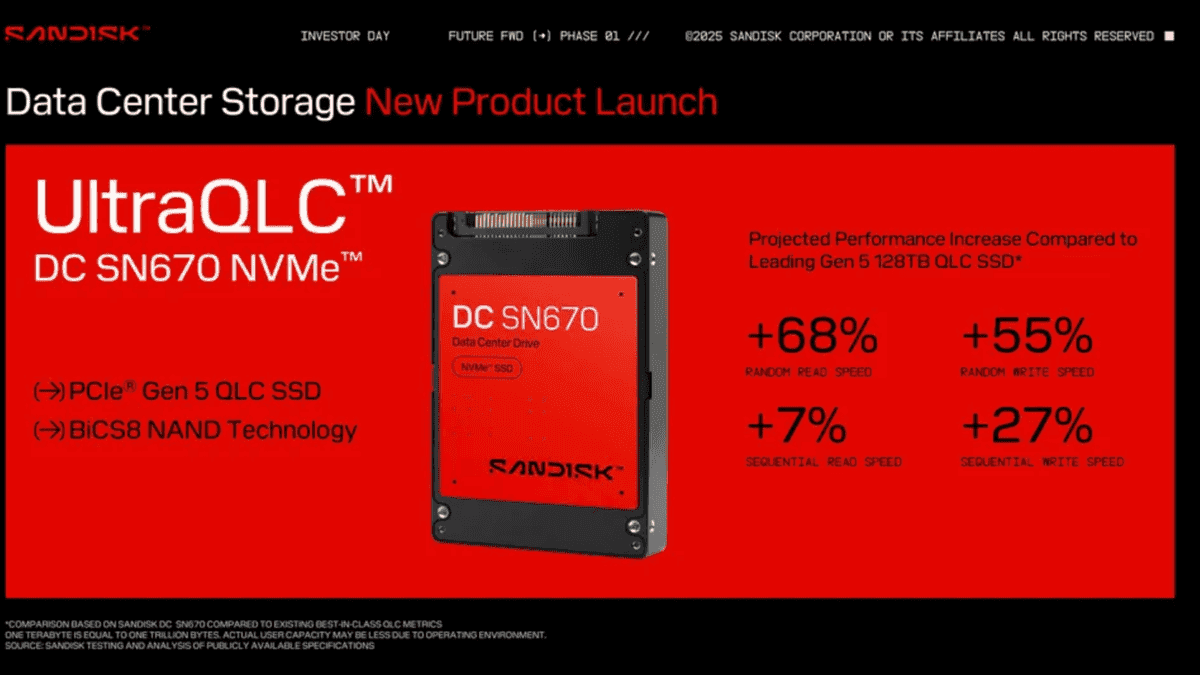TeamGroup Unveils P250Q: A Self-Destructing SSD for Ultra-Secure Data Protection
5 Sources
5 Sources
[1]
This M.2 SSD Can Self-Destruct By Giving Itself a Burst of Voltage
The vendor Team Group is marketing the self-destruct SSD to customers in sensitive industries, including defense, factory automation and AI development. Worried your data could fall into the wrong hands? A company has developed an M.2 SSD storage drive that can self-destruct by frying its own memory. The product, the P250Q Self-Destruct SSD, is engineered to instantly wipe its memory at the push of a button -- either through a software-based erasure or a hardware method that's supposed to physically destroy the flash chip. The product comes from the Taiwanese memory vendor Team Group, which is marketing the SSD to customers working in sensitive industries, including defense, factory automation and AI development. "The P250Q is equipped with a patented independent destruction circuit that enables precise data erasure at the hardware level by directly targeting the Flash IC (integrated circuit)," the vendor says. The company initially introduced the P250Q for Taiwan's Computex show before launching the product on Friday. Of course, users can destroy an M.2 SSD the old fashioned way by physically breaking it or throwing it into a fire. Still, Team Group's method promises to be efficient in the event your home or office is facing a raid. In a video simulating the self-destruct mechanism, Team Group showed the SSD can be installed on a PC motherboard. Customers can then choose between the software-based or the hardware-based self-erasure, which "uses high voltage breakdown technology to physically destroy NAND Flash, ensuring data is irrecoverable." In the video, the company demos the hardware-based self-destruct, which takes 10 seconds and causes the SSD to apparently emit smoke, permanently destroying the flash memory. An LED light on the product also flashes, confirming the erasure is occurring. How the self-destruct mechanism actually appears to users is less clear. Team Group also hasn't revealed the product's cost. Instead, it's asking interested customers to contact the company. "The P250Q adopts a PCIe Gen4x4 interface and complies with the NVMe 1.4 protocol, delivering read speeds of up to 7,000 MB/s and write speeds of up to 5,500 MB/s to support data processing under mission-critical workloads," Team Group added. Buyers can also tap the software-based quick erase function, ensuring they can re-use the SSD again. Team Group says the software-based method features "an auto-resume function that ensures data destruction continues seamlessly after an unexpected power outage, guaranteeing the complete elimination of sensitive information."
[2]
Self-destructing SSD brings espionage-level security to data protection
Serving tech enthusiasts for over 25 years. TechSpot means tech analysis and advice you can trust. Something to look forward to: It's the kind of gadget Q might slip into James Bond's tuxedo pocket: an SSD with a built-in self-destruct feature. TeamGroup has developed the P250Q-M80, which brings a touch of cinematic espionage to real-world data security. This industrial-grade storage device is engineered for sectors where data security is paramount, such as defense, industrial automation, and AI development. The P250Q-M80 stands out for its dual-mode data destruction system. At the heart of this innovation is a patented independent destruction circuit. With a single press of a dedicated button, users can choose between two levels of data erasure. A brief press triggers a software-based wipe, which erases all stored data while preserving the drive for future use. This process is supported by an intelligent system that resumes the erasure if power is lost mid-operation, ensuring that no data remains accessible once the process is complete. For situations demanding absolute certainty, a longer press activates hardware-level destruction. This method sends a high-voltage burst directly to the NAND flash chips, physically destroying them to make data recovery impossible. Multi-stage LED indicators visually confirm the process. Beyond its headline feature, the P250Q-M80 is built to endure the rigors of industrial use. It offers sequential read speeds up to 7,000 MB/s and write speeds up to 5,500 MB/s, leveraging a PCIe Gen4x4 interface and NVMe 1.4 protocol. The drive is available in capacities ranging between 256GB to 2TB, utilizing high-reliability 3D TLC NAND flash. It complies with military standards for shock and vibration resistance, features an operational temperature range suited for harsh environments, and S.M.A.R.T. health monitoring to track device longevity. The company also holds a US patent for its wide-temperature operation technology, which allows the SSD to automatically adjust its transfer speeds across three thermal zones, supporting performance in environments where temperatures can soar well above those tolerated by consumer-grade hardware. Although Team Group has not yet announced pricing or availability for the P250Q-M80, the device's blend of high-speed performance and advanced data destruction features positions it as a notable entry in the market for secure storage solutions. The P250Q-M80 recently received a Best Choice Award in the cybersecurity category at Computex 2025.
[3]
New ultra-secure SSD can self-destruct to protect sensitive data
Taiwanese company TeamGroup has unveiled a new internal SSD that can literally destroy itself at the press of a button, ensuring sensitive data never falls into the wrong hands. The device, called the P250Q-M80, is aimed at sectors where top-tier data security isn't just a perk, it's a necessity. We're talking defense, industrial automation, AI development, and maybe even the crypto wallet you hold. TeamGroup showcased the drive at Computex 2025, where it took home a Best Choice Award in the cybersecurity category. At the core of the P250Q-M80 is a dedicated self-destruction circuit, which can be triggered in two ways. A short press initiates a software-level wipe that erases all stored data while keeping the drive functional. It even includes an auto-resume feature, which kicks in if the power is cut mid-wipe, finishing the job when power returns. But the real highlight is the hardware-level data kill switch. Holding the external red button for 5 to 10 seconds sends a high-voltage surge directly into the NAND flash chips, physically destroying them. A multi-stage LED system provides visual confirmation of the process.
[4]
Industrial-Grade Self-Destruct SSD: Team Group Releases P250Q NVME SSD
If you need a secure NVMe SSD that can physically obliterate your data on demand, the Team Group P250Q might catch your eye. Under the hood, this drive combines a hardware-led destruction circuit with a smart software erasure routine. Press the dedicated button, and the circuit zaps the flash chips directly -- no software calls needed. Alongside that, a set of LEDs shows you exactly where you are in the process. And just to make sure nothing goes wrong if the power cuts out mid-erase, the SSD's firmware picks up where it left off once juice is back. Performance-wise, the P250Q sits on a PCIe Gen4×4 lane and follows the NVMe 1.4 protocol. You'll see sequential read rates as high as 7 GB/s and writes near 5.5 GB/s, which is plenty for heavy-duty industrial tasks or large-scale AI datasets. It comes in four sizes -- 256 GB, 512 GB, 1 TB, and 2 TB -- all built on 3D TLC NAND. To keep an eye on drive health, there's S.M.A.R.T. monitoring baked in, so you can track wear levels and preemptively swap it out before failure. Beyond the data-destruction feature, Team Group also clinched a U.S. patent for a wide-temperature M.2 SSD. This patent covers a scheme that automatically tweaks data-transfer rates across three heat zones between 85 °C and 105 °C. Why does that matter? In contexts like electric-vehicle controllers, industrial robotics, or vehicle infotainment units, ambient temperatures can spike well above consumer-grade hardware tolerances. By adjusting performance to suit the thermal load, the SSD stays stable even when it feels like an oven inside the equipment bay. Breaking it down: Hardware Erasure Circuit The P250Q sports a dedicated destruction chip that blasts selected flash packages. It's a purely electrical approach: no file-system commands needed. You hit the button, and the flash ICs get overwritten or physically disrupted -- whatever the patent covers -- to render stored bits unreadable. Auto-Resume Software Erase In case the power goes out, the SSD's controller logs the erasure state. Once power returns, it resumes destroying leftover data. That way, you don't end up with half-erased sectors that could be recovered later. LED Progress Indicators Four discrete LEDs light up in stages to show initialization, active destruction, verification, and completion. This makes it easy to monitor without needing a host system or GUI. NVMe Gen4×4 Speeds With up to 7,000 MB/s reads and 5,500 MB/s writes, it handles large sequential transfers effortlessly. Random I/O benefits too, thanks to the NVMe protocol's command queuing. Capacity and Endurance Available from 256 GB to 2 TB, these SSDs use 3D TLC NAND Flash -- balancing cost, density, and write endurance. S.M.A.R.T. telemetry keeps you informed on wear levels and remaining life expectancy. Wide-Temperature Patent The new patent covers an algorithm that segments the drive's operating range into three thermal zones. As temperatures climb, the controller dials back transfer speeds to reduce heat generation, then scales them up when things cool down. It's ideal for hot-running applications in vehicles and factories. The P250Q targets scenarios where data security and operational stability under harsh conditions are non-negotiable. Whether you're managing classified files on a military network or running analytics in a blazing-hot factory floor, having a self-destruct SSD with adaptive thermal controls can be a game-changer. The finished drive delivers a blend of hardware robustness, intelligent firmware, and high throughput -- minus the fluff - product page.
[5]
TEAMGROUP Launches P250Q Self-Destruct SSD for Ultra-Secure Industrial Applications
The P250Q adopts a PCIe Gen4x4 interface and complies with the NVMe 1.4 protocol, delivering read speeds of up to 7,000 MB/s and write speeds of up to 5,500 MB/s to support data processing under mission-critical workloads. Team Group Inc. officially unveiled its latest breakthrough in industrial storage: the TEAMGROUP INDUSTRIAL P250Q Self-Destruct SSD. This innovative solution integrates both software and hardware-based data erasure mechanisms, paired with an independent destruction circuit. Engineered to meet the stringent security and stability requirements of military, industrial automation, and AI applications, the P250Q sets a new benchmark for data protection and was recently honored with the 2025 COMPUTEX Best Choice Award for Cyber Security Category.
Share
Share
Copy Link
Taiwanese company TeamGroup has introduced the P250Q-M80, an industrial-grade SSD with a unique self-destruct feature, targeting industries requiring top-tier data security such as defense, industrial automation, and AI development.
Introducing the P250Q: A New Era in Data Security
TeamGroup, a Taiwanese memory vendor, has unveiled its latest innovation in data security: the P250Q Self-Destruct SSD. This groundbreaking storage device, which recently received a Best Choice Award in the cybersecurity category at Computex 2025, is designed to meet the stringent security requirements of sensitive industries such as defense, industrial automation, and AI development
1
2
.
Source: Guru3D
Dual-Mode Data Destruction System
At the heart of the P250Q's security features is a patented independent destruction circuit that offers two levels of data erasure
3
:-
Software-based wipe: A brief press of a dedicated button triggers a complete erasure of all stored data while preserving the drive for future use. This method includes an intelligent system that resumes the erasure process if power is lost mid-operation
2
. -
Hardware-level destruction: A longer press activates a high-voltage burst sent directly to the NAND flash chips, physically destroying them and making data recovery impossible
2
3
.
Multi-stage LED indicators provide visual confirmation of the erasure process, ensuring users can monitor the status without needing a host system or GUI
4
.High-Performance Specifications
The P250Q is not just about security; it also delivers impressive performance for demanding industrial applications:
- PCIe Gen4x4 interface with NVMe 1.4 protocol support
- Sequential read speeds up to 7,000 MB/s
- Write speeds up to 5,500 MB/s
- Available in capacities ranging from 256GB to 2TB
- Utilizes high-reliability 3D TLC NAND flash
2
5
Durability and Thermal Management
TeamGroup has engineered the P250Q to withstand harsh industrial environments:
- Complies with military standards for shock and vibration resistance
- Features an operational temperature range suited for extreme conditions
- Incorporates S.M.A.R.T. health monitoring to track device longevity
2
Additionally, TeamGroup holds a US patent for wide-temperature operation technology, allowing the SSD to automatically adjust its transfer speeds across three thermal zones. This feature supports performance in environments where temperatures can exceed those tolerated by consumer-grade hardware
2
4
.
Source: TechSpot
Related Stories
Applications and Target Markets
The P250Q is positioned as a critical component for sectors where data security is paramount:
- Defense and military operations
- Industrial automation
- AI development and research
- Cryptocurrency storage
- Any scenario requiring top-tier data protection
3
Industry Recognition
The innovative features of the P250Q have not gone unnoticed in the tech industry. The drive was showcased at Computex 2025, where it received a Best Choice Award in the cybersecurity category, highlighting its significance in the field of data security
3
5
.As data breaches and security threats continue to evolve, solutions like the P250Q demonstrate the industry's commitment to developing advanced technologies that protect sensitive information. While pricing and availability details are yet to be announced, the P250Q's blend of high-speed performance and advanced data destruction features positions it as a notable entry in the market for secure storage solutions
2
5
.References
Summarized by
Navi
[3]
Related Stories
Crucial Unveils High-Performance SSDs: T710 PCIe Gen5 and X10 Portable Drive
20 May 2025•Technology

Micron Unveils World's First PCIe 6.0 SSD, Revolutionizing Data Center Storage
30 Jul 2025•Technology

Phison Unveils Groundbreaking 128TB PCIe Gen5 SSD for Data Centers and AI Applications
13 Nov 2024•Technology

Recent Highlights
1
Google Gemini 3.1 Pro doubles reasoning score, beats rivals in key AI benchmarks
Technology

2
ByteDance's Seedance 2.0 AI video generator triggers copyright infringement battle with Hollywood
Policy and Regulation

3
ChatGPT cracks decades-old gluon amplitude puzzle, marking AI's first major theoretical physics win
Science and Research





